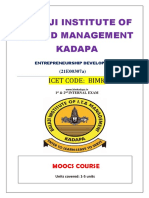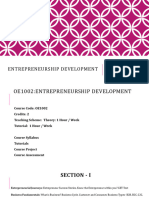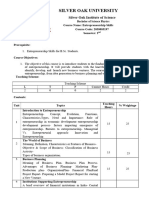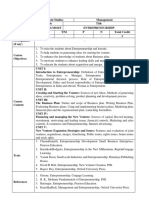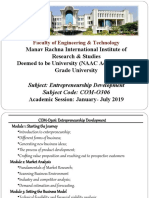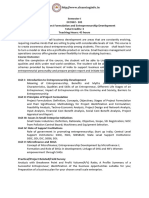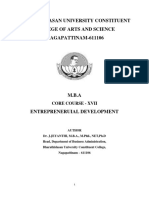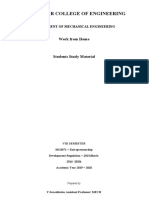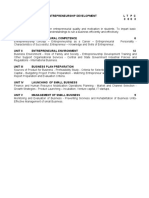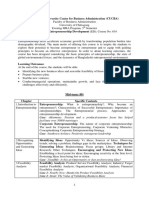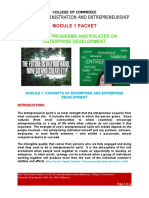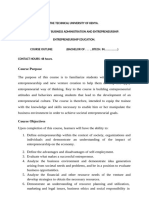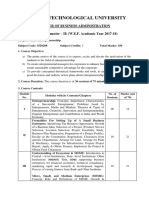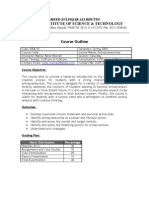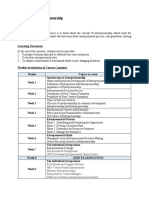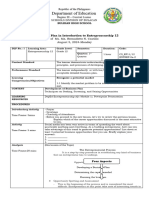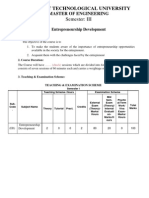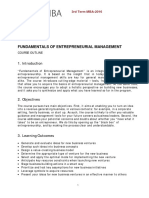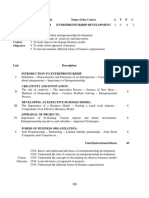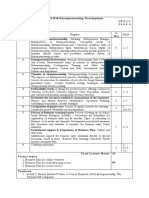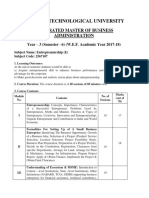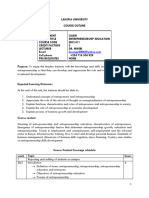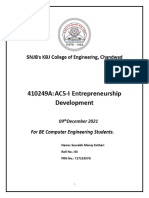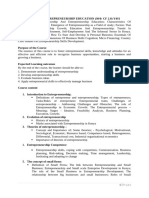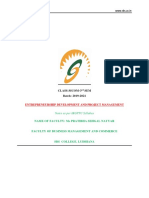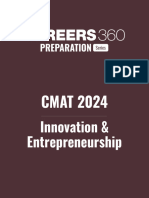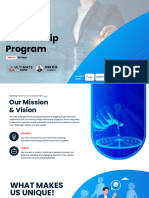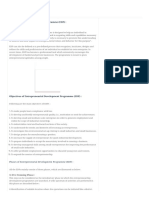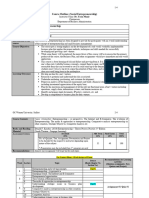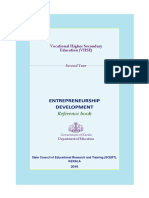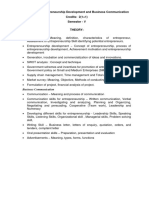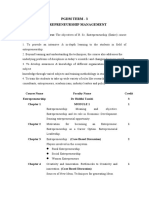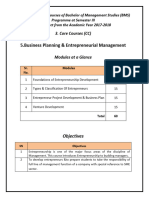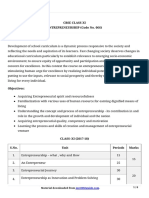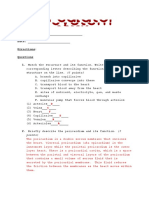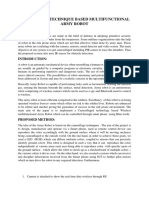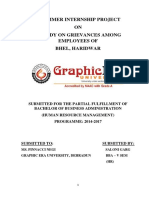Pcte Group of Institutes: Department of Business Managementpage 1
Pcte Group of Institutes: Department of Business Managementpage 1
Uploaded by
Pranav MittalCopyright:
Available Formats
Pcte Group of Institutes: Department of Business Managementpage 1
Pcte Group of Institutes: Department of Business Managementpage 1
Uploaded by
Pranav MittalOriginal Description:
Original Title
Copyright
Available Formats
Share this document
Did you find this document useful?
Is this content inappropriate?
Copyright:
Available Formats
Pcte Group of Institutes: Department of Business Managementpage 1
Pcte Group of Institutes: Department of Business Managementpage 1
Uploaded by
Pranav MittalCopyright:
Available Formats
PCTE GROUP OF INSTITUTES
Department of Business ManagementPage 1
PCTE GROUP OF INSTITUTES
COURSE OUTCOME
Students shall be able to start innovative and sustainable new business by learning -
1. Trend analysis to understand what type of businesses are sustainable.
2. Creativeness and techniques to generate sustainable business ideas
3. How to forecast potential of considered businesses
4. How to create a firm?
5. What are all essential registrations for business-development?
6. How to select business locations?
7. How to arrange funding for new ventures?
8. How to prepare presentable Business Plans?
SYLLABUS
Click here to enter text.
Unit I
Unit I
Foundations of Entrepreneurship: Concept , Need, Definition & role of Entrepreneurship , Definition, characteristics& scope of Entrepreneur, Innovation,
Invention, Creativity,
Opportunities . Concepts of Entrepreneur, Manager, Intrapreneur / Corporate Entrepreneur, comparative study ,
Roles& Responsibilities. Role of entrepreneur in Indian economy, Entrepreneurship as a career, Sustaining Competitiveness - Maintaining competitive
advantage,
Department of Business ManagementPage 2
PCTE GROUP OF INSTITUTES
Entrepreneurial culture. Reasons for the failure of entrepreneurial ventures, various case studies- successful, failed and turnaround ventures.
Unit II
Women entrepreneurs& Entrepreneurship Development:-Meaning, role, problems& reasons for less women entrepreneurs.
Various institutes & Govt schemes to help &uplift women entrepreneurs. Case studies for successful women entrepreneurs.
Concept, need & role of Entrepreneurship Development. Role of the following agencies in the Entrepreneurship - Development DIC , SISI ,EDII &NIESBUD .
Unit III
Small& Medium Enterprises:- Small & Medium Industry: Meaning and importance - Definition of SME –role & importance in India Economy, Steps for
Starting Small Industry:
Decisions to become entrepreneur - Steps to be taken - Search for a business idea, source of ideas, idea processing, selection idea, input requirements,
Nature and Components of SME Environment, SME Funding, Sources of Finance for SME’s.
Unit IV
Project Management Technical, Financial, Marketing Personnel and Management feasibility Reports
Financial schemes offered by various financial institutions like Commercial Banks, IDBI, ICICI, SIDBI, SFCs, Venture Capital Funding, Angle Capitalist. Role of
Central Government and State Government in Promoting Entrepreneurship with various incentives, subsidies, grants.
REFERENCE BOOKS
● Vasant Desai Management of small scale industries, Himalaya Publishing
● Angadi, Cheema, Das, Entrepreneurship, Growth, and Economic Integration, Himalaya Publication
● Rajiv Roy – Entrepreneurship- Oxford University Press
Department of Business ManagementPage 3
PCTE GROUP OF INSTITUTES
● Dr. R.K Gupta & Lipika k.Guliani Fundamentals of entrepreneurship development & project management-Himalaya Publication (in press)
● Rizwana and Janakiran, Entrepreneurship Development, Excel Books
● Murthy, Small Scale Industry and Entrepreneurial Development, Himalaya Publishing
● Robert D Hisrich- Entrepreneurship- McGraw Hill
● Poornima Charanthimath- Entrepreneurship
●
EVALUATION CRITERIA
PARAMETER MARKS
First Hourly 20 marks
Mid Semester Examination 60
Viva Voce for 2nd hourly 20
Case Study- discussions 10
B Plan for selected idea+ presentation 30
Idea generation and pitch 10+10
Total 160
PRESENTATION DETAILS
Presentations will be on the basis of business plan developed by individual student. It shall be divided into two parts. The first part will be an elevator pitch
and the second will be a detailed presentation after submitting the complete project report and all the stages of business plan.
Department of Business ManagementPage 4
PCTE GROUP OF INSTITUTES
SIGNMENTS/ACTIVITIES/MAJOR PROJECT
1. Your business idea to solve an existing problem of masses
2. who are your potential competitors or who are the businesses which are meeting needs of your targeted consumers, may be poorly?
3. Why consumers shall leave existing solution providers and come to you?
4. What shall be your pricing and tentative profit?
Project stage 2
1. Operations plan including equipment and technology needed – projected for 3 years
2. Marketing plan with promotion plan – projected for 3 years
3. HR plan with source, qualification and salary grades for manpower – projected for 3 years
4. Budget – projected for 3 years showing Capital requirements, working capital requirements, and sales revenue. And profit loss
statements
5. Fund flows – projected for 3 years
CLASSROOM POLICIES
● Class on every topic will consist of introduction about concept and framework followed by discussion on the readings given.
● The readings relate to important know-hows for Indian market
● The lectures which do not have a reading attached will have time devoted to case conceptualisation and writing/presentation
Department of Business ManagementPage 5
PCTE GROUP OF INSTITUTES
COURSE PLAN
Lec. Session
Content Case Study/Article Assignment/Project
No Recap
My expectations- you be an
entrepreneur and start a modern
innovative business of your own
after exam
Tell me your expectations? What
you want to learn before starting
your business. I shall fulfill all. Video – Mark Zuckerberg interview
1
What type of businesses could be
sustainable? What are trends? Nirma, Ola? Red Bus? Myles?
2
Definition, of Entrepreneurship
3
Characteristics & scope of
Entrepreneur,
4
Innovation & Invention-
Importance
5
Creativity, Opportunities
6
Department of Business ManagementPage 6
PCTE GROUP OF INSTITUTES
Concepts of Entrepreneur, Manager,
Intrapreneur / Corporate
Entrepreneur, comparative study ,
input requirements,
7
Role of entrepreneur in Indian
economy, Entrepreneurship as
a career, Stages- video
8
Decisions to become entrepreneur -
Steps to be taken - Search for a
business idea,
9
source of ideas and role of
trends in looking for ideas.
10
Generating ideas, Creative
problem solving
11
idea processing, selection of
idea, Input requirements
12
Idea presentations
13
Idea presentations
14
Idea presentations
15
Department of Business ManagementPage 7
PCTE GROUP OF INSTITUTES
Idea presentations
16
Entrepreneurial culture. Reasons
for the failure of entrepreneurial
ventures,
17
various case studies- successful,
failed and turnaround ventures. Video- Gurbaksh Chahal
18
Case and Quiz Dvid Reynolds case and Quiz
19
10 Successful starts ups from IITs
and IIMs cases
20
Roles& Responsibilities.
Sustaining Competitiveness -
Maintaining competitive
advantage,
Nature and Components of SME
Environment, Guest lecture about govt. schemes for start-ups
21
Creating firm- Proprietorship,
partnership
22
Department of Business ManagementPage 8
PCTE GROUP OF INSTITUTES
Creating firm- Private and public
limited co.
23
SME Funding, Sources of
Finance for SME’s.
24
Financial schemes offered by
various financial institutions like
Commercial Banks, IDBI, ICICI,
25 SIDBI, SFCs,
Venture Capital Funding, Angle
Capitalist. Role of Central
Government and State
Government in Promoting
Entrepreneurship with various
incentives, subsidies, grants.
26
Preparing B Plans, Importance of B
Plan # hour special session with practicing CA specialising in
components of B Plan Project funding
27
Department of Business ManagementPage 9
PCTE GROUP OF INSTITUTES
Project Management Technical,
Financial, Marketing Personnel and
Management feasibility Reports
28
Definition of SME –role &
importance in India Economy,
29
Steps for Starting Small Industry:
registrations required
30
Women entrepreneurs&
Entrepreneurship
Development:-Meaning, role,
problems& reasons for less
women entrepreneurs.
31
Various institutes & Govt schemes to
help &uplift women entrepreneurs.
Case studies for successful women
entrepreneurs.
32
Concept, need & role of
Entrepreneurship Development.
33
Entrepreneurial culture. Reasons
for the failure of entrepreneurial
ventures,
34
Department of Business ManagementPage 10
PCTE GROUP OF INSTITUTES
Role of the following agencies in
the Entrepreneurship
Development- DIC ,
35
SISI ,EDII & NIESBUD .
36
37-4 Viva for 2nd Hrly
2
Department of Business ManagementPage 11
You might also like
- BBA Entrepreneurship Fall-2022 DR FarooqDocument6 pagesBBA Entrepreneurship Fall-2022 DR FarooqSyed WasiNo ratings yet
- Welcome TO: Fourth TermDocument38 pagesWelcome TO: Fourth Termanoopsinhgh100% (1)
- 21e00307a - ENTREPRENEURSHIP DEVELOPMENT (MOOCS)Document117 pages21e00307a - ENTREPRENEURSHIP DEVELOPMENT (MOOCS)Beedam BalajiNo ratings yet
- ED Introduction ClassDocument75 pagesED Introduction Classgauravdakhore15No ratings yet
- Entrepreneurship & Start-UpsDocument2 pagesEntrepreneurship & Start-UpsRocky RajNo ratings yet
- Silver Oak UniversityDocument2 pagesSilver Oak Universitysandiprai00005No ratings yet
- Inter Preneur ShipDocument135 pagesInter Preneur Shipkaran kushwahNo ratings yet
- Entrepreneurship Development (UG)Document6 pagesEntrepreneurship Development (UG)Shikhar PatidarNo ratings yet
- Manav Rachna International Institute of Research & Studies Deemed To Be University (NAAC Accredited A' Grade UniversityDocument152 pagesManav Rachna International Institute of Research & Studies Deemed To Be University (NAAC Accredited A' Grade UniversityshadyNo ratings yet
- 2HS601: Entrepreneurship Development (3 0 0 3 0)Document2 pages2HS601: Entrepreneurship Development (3 0 0 3 0)iaminterwebzNo ratings yet
- CVM University: Syllabus For An Internal Evaluation ExamDocument1 pageCVM University: Syllabus For An Internal Evaluation ExamKarmdeepsinh ZalaNo ratings yet
- SEC-101 2tyjt3ykDocument2 pagesSEC-101 2tyjt3ykimran.khandnsNo ratings yet
- Entrepreneurship Development: Credits: 04Document1 pageEntrepreneurship Development: Credits: 04Ningambika MetiNo ratings yet
- 387 P16mba17 2020051606022529Document266 pages387 P16mba17 2020051606022529JcharlesvNo ratings yet
- MG6071-ED-Students Study Material-Work From HomeDocument26 pagesMG6071-ED-Students Study Material-Work From HomesureshbabuNo ratings yet
- EDP Project: Jatin NasaDocument23 pagesEDP Project: Jatin NasaLakshay ManchandaNo ratings yet
- Ed SyllabusDocument2 pagesEd SyllabusAnonymous ZB6qyhD6No ratings yet
- ENTREPRENEURSHIP DEVELOPMENT - QB Part BDocument4 pagesENTREPRENEURSHIP DEVELOPMENT - QB Part Bparandaman.mechNo ratings yet
- Presentation 1Document56 pagesPresentation 1akashieladawy223No ratings yet
- 634 Entrepreneurship DevelopmentDocument2 pages634 Entrepreneurship DevelopmentProf-Syed Ahsanul AlamNo ratings yet
- Ec 413 - Programs and Policies On Enterprise Development: Business Administration and EntrepreneurshipDocument12 pagesEc 413 - Programs and Policies On Enterprise Development: Business Administration and EntrepreneurshipDaienne Abegail EspinosaNo ratings yet
- Entrepreneurship Education Ssfi 4108Document7 pagesEntrepreneurship Education Ssfi 4108Eliminator JandiruNo ratings yet
- I Am Sharing '20th May 2024-TOPIC 1 INTRODUCTION ENTREPRENEURSHIP SKILLS 2' With YouDocument34 pagesI Am Sharing '20th May 2024-TOPIC 1 INTRODUCTION ENTREPRENEURSHIP SKILLS 2' With YouAlex WambuguNo ratings yet
- Gujarat Technological UniversityDocument5 pagesGujarat Technological Universityshlokshah2006No ratings yet
- Course Outline - EntrepreneurshipDocument3 pagesCourse Outline - EntrepreneurshipMariam Virani100% (7)
- Directorate of Distance Education: University of Jammu JammuDocument533 pagesDirectorate of Distance Education: University of Jammu JammuAlazer Tesfaye Ersasu TesfayeNo ratings yet
- BS311-Entrepreneurship (WL-Plan)Document2 pagesBS311-Entrepreneurship (WL-Plan)Ammar YousafNo ratings yet
- SchemeId 2219 NSTEDB TrainingProgrammeonEntrepreneurship 1fDocument26 pagesSchemeId 2219 NSTEDB TrainingProgrammeonEntrepreneurship 1fLittle Talents Pre-school, Undavalli CenterNo ratings yet
- EntrepreneurshipDocument14 pagesEntrepreneurshipVani DupatiNo ratings yet
- Extn 355 Printed Notes 1Document59 pagesExtn 355 Printed Notes 1Vikki Nandeshwar100% (1)
- Entrep12 W2-D1Document4 pagesEntrep12 W2-D1castillomabernadette3013No ratings yet
- Course Matrix: Master of Business Administration Regular (Day) Course Revised Syllabus (With Effect From 2007-2008)Document27 pagesCourse Matrix: Master of Business Administration Regular (Day) Course Revised Syllabus (With Effect From 2007-2008)Manoranjan ManuNo ratings yet
- Entrepreneurship Essentials: TopicsDocument56 pagesEntrepreneurship Essentials: TopicsSurbhi AmbadeNo ratings yet
- Entrepreneurship DevelopmentDocument3 pagesEntrepreneurship Developmentcharu73No ratings yet
- 6) Fundamentals-Entrepreneurial-Management - tcm41-190276 PDFDocument7 pages6) Fundamentals-Entrepreneurial-Management - tcm41-190276 PDFHaris -No ratings yet
- Ed Syllabus 1Document2 pagesEd Syllabus 1Vinoth KumarNo ratings yet
- ED FirstYear TextBookDocument92 pagesED FirstYear TextBookbennybenny1106No ratings yet
- Business Plan For Online Business 2. Business Plan For Manufacturing Sector 3. Business Plan For Service SectorDocument2 pagesBusiness Plan For Online Business 2. Business Plan For Manufacturing Sector 3. Business Plan For Service SectorAtul PandeyNo ratings yet
- Gujarat Technological University: Integrated Master of Business AdministrationDocument3 pagesGujarat Technological University: Integrated Master of Business AdministrationMRDIYA DHARMIKNo ratings yet
- Edci 411- Lecture Series-1Document50 pagesEdci 411- Lecture Series-1Duncan GitongaNo ratings yet
- Enterprenuership 22-23 Class 12Document15 pagesEnterprenuership 22-23 Class 12Parth BeriNo ratings yet
- Enterprenurship Development ReportDocument63 pagesEnterprenurship Development ReportVedant MaindadNo ratings yet
- EDCI 411 Course Outline Latest With Notes-1Document24 pagesEDCI 411 Course Outline Latest With Notes-1amososoi738No ratings yet
- Complete Notes of Entrepreneurship and Project Management McomDocument197 pagesComplete Notes of Entrepreneurship and Project Management Mcomdivya raniNo ratings yet
- CMAT 2024 Innovation Entrepreneurship - mBX6GlTDocument80 pagesCMAT 2024 Innovation Entrepreneurship - mBX6GlTushajaisur123No ratings yet
- Finance - Mentorship With Ultimate Gurus Personal Finance Course by Nikhil KamathDocument13 pagesFinance - Mentorship With Ultimate Gurus Personal Finance Course by Nikhil KamathHarshit AroraNo ratings yet
- Department of Management Sciences Imperial College of Business StudiesDocument4 pagesDepartment of Management Sciences Imperial College of Business StudiesArqam Javed KayaniNo ratings yet
- Esbm (406) Unit 2Document69 pagesEsbm (406) Unit 2Vaibhav ShrotriNo ratings yet
- Entrepreneurial Development Programme (EDP) :: According To N. P. SinghDocument4 pagesEntrepreneurial Development Programme (EDP) :: According To N. P. SinghRahul MishraNo ratings yet
- Social - EntrepreneurshipDocument4 pagesSocial - EntrepreneurshipQandeel ZahraNo ratings yet
- Entrepre-Development Final PDFDocument112 pagesEntrepre-Development Final PDFShwetha GyNo ratings yet
- Extn 355 Notes FinalDocument59 pagesExtn 355 Notes Finaldnyaneshwarwarangule298No ratings yet
- Lesson Plan EntrepreneurshipDocument4 pagesLesson Plan EntrepreneurshipRIDDHI TAMBINo ratings yet
- Gujarat Technological UniversityDocument4 pagesGujarat Technological UniversityHarishNo ratings yet
- Understanding Entrepreneurship and The EntrepreneurDocument3 pagesUnderstanding Entrepreneurship and The EntrepreneurTushar BhatiNo ratings yet
- EDP Saarc CountriesDocument21 pagesEDP Saarc CountriesDewan Sazzadul KarimNo ratings yet
- Entrepreneurial DevelopmentDocument1 pageEntrepreneurial Developmentv dheenadhayalanNo ratings yet
- Business Planning & Entrepreneurial ManagementDocument2 pagesBusiness Planning & Entrepreneurial Managementmaviya7869No ratings yet
- Cbse Class Xi Entrepreneurship (Code No. 066) : Material Downloaded From - 1 / 8Document8 pagesCbse Class Xi Entrepreneurship (Code No. 066) : Material Downloaded From - 1 / 8Dhiraj KrNo ratings yet
- Quantum CryptographyDocument20 pagesQuantum CryptographyBridget Smith100% (1)
- Smart Farming With TechnologyDocument21 pagesSmart Farming With TechnologyhexemapNo ratings yet
- ALO WAIVER-finalDocument14 pagesALO WAIVER-finalJasper Alon100% (1)
- Examen FísicaDocument8 pagesExamen FísicaMIldre666No ratings yet
- Star Map Egypt and The Human Blueprint CodeDocument7 pagesStar Map Egypt and The Human Blueprint CodeJon Land100% (1)
- General Notes:: Panel Board Diagram Load ScheduleDocument1 pageGeneral Notes:: Panel Board Diagram Load SchedulebeaNo ratings yet
- TEXTSDocument4 pagesTEXTSZak berryNo ratings yet
- Sourcing Decisions in A Supply Chain: ( .) RemainingDocument16 pagesSourcing Decisions in A Supply Chain: ( .) Remainingmohdarif22No ratings yet
- Css Assignment (1) 22dce077Document9 pagesCss Assignment (1) 22dce077Patel Kunj bhNo ratings yet
- Number SystemDocument29 pagesNumber Systemsamana samiNo ratings yet
- Comprehensive Notes On Introduction To Literature by Rizwan Anjum-WPS OfficeDocument29 pagesComprehensive Notes On Introduction To Literature by Rizwan Anjum-WPS OfficeRizwan HaiderNo ratings yet
- Displacementofhalogens Structure Strips 618963Document3 pagesDisplacementofhalogens Structure Strips 618963Project InfoNo ratings yet
- Answer Key Circulatory System QuizDocument6 pagesAnswer Key Circulatory System Quizapi-534129744No ratings yet
- Tembusu Partners Sells Stake in Homegrown Education Group Ednovation To Private Equity Firm CDH Investments For Over S$50MDocument3 pagesTembusu Partners Sells Stake in Homegrown Education Group Ednovation To Private Equity Firm CDH Investments For Over S$50MWeR1 Consultants Pte LtdNo ratings yet
- Camouflage Technique Based Multifunctional Army RobotDocument3 pagesCamouflage Technique Based Multifunctional Army RobotKarthik SNo ratings yet
- TH Financial Sector Key Challenges For 2018 FebDocument9 pagesTH Financial Sector Key Challenges For 2018 FebMonika SainiNo ratings yet
- Chapter 1 PDFDocument6 pagesChapter 1 PDFsneha mallikaNo ratings yet
- Clavier-Übung III by JSB, WikipediaDocument46 pagesClavier-Übung III by JSB, WikipediaedmobreNo ratings yet
- A New C V FormatDocument4 pagesA New C V FormatnimeshNo ratings yet
- Anthony Lellouche: Work Experience SkillsDocument1 pageAnthony Lellouche: Work Experience Skillsadmin StilyoAppsNo ratings yet
- A Summer Internship Project ON A Study On Grievances Among Employees of Bhel, HaridwarDocument51 pagesA Summer Internship Project ON A Study On Grievances Among Employees of Bhel, HaridwarMukeshchandra yadavNo ratings yet
- DLL For COT IN MAPEH 7 2nd QTRDocument4 pagesDLL For COT IN MAPEH 7 2nd QTRMA Cecilia CuatrizNo ratings yet
- Assignment 1 - Engineering Data Analysis PDFDocument3 pagesAssignment 1 - Engineering Data Analysis PDFMarc RiveraNo ratings yet
- LiquefactionproceduresJun99 PDFDocument70 pagesLiquefactionproceduresJun99 PDFKatherine Shayne YeeNo ratings yet
- Project 1Document11 pagesProject 1teferi GetachewNo ratings yet
- 2.1 System Analysis 2.2 Identification 2.3 Preliminary Investigation 2.4 Feasibility StudyDocument66 pages2.1 System Analysis 2.2 Identification 2.3 Preliminary Investigation 2.4 Feasibility Studyjasmina0% (1)
- Pre - TestDocument6 pagesPre - Testjanice aguilarNo ratings yet
- Dna Replication WorksheetDocument3 pagesDna Replication WorksheetSakina İmanovaNo ratings yet
- Introduction To Industrial RelationsDocument32 pagesIntroduction To Industrial RelationsTeena TanejaNo ratings yet
- 2007 JEEP Vehicle Diagnostic Report - 1J8HR58P57C692801 - 20231112131259Document5 pages2007 JEEP Vehicle Diagnostic Report - 1J8HR58P57C692801 - 20231112131259eys.automotricesNo ratings yet



